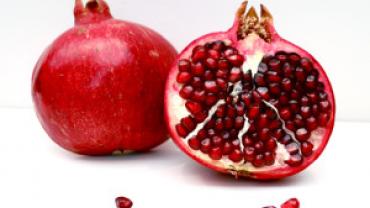
While biblically the poor maligned apple was regarding as the forbidden fruit that led to the downfall of man and the origin of sin there are a number of Jewish scholars that suggest that it was actually the pomegranate that was the fruit from The Tree of Knowledge. Indeed while the apple has an illustrious cultural symbolic and even religious history the pomegranate does not take a back seat in those departments.
While mythology and archetypal symbology is a fascinating and blog-worthy subject today's blog entry however is about the healing power of the pomegranate which in my opinion is one of nature's great gifts. All portions of the fruit including the flowers seeds skin juice and oil can be used for a variety of applications with recent research focusing on pomegranate's antioxidative anti-carcinogenic and anti-inflammatory properties. Like many therapeutically relevant medicinal plants it is the polyphenol family contained in the pomegranate that holds the most promise. These active compounds include ellagic acid ellagitannins (including punicalagins) punicic acid flavonoids anthocyanidins and anthocyanins.
While pomegranate juice has become extremely popular in the retail market its ideal daily consumption can be expensive. Therefore supplementation of juice and fruit extracts can be a much more practical and convenient option. One study evaluated the effectiveness of delivery of actives between juice and extract and demonstrated that both were similar in providing levels of polyphenolic metabolites in both serum and urine therefore suggesting that supplementation may be nutritionally and therapeutically more practical.
Insulin Sensitivity
With the continued rise in rates of diabetes discovering therapeutic tools that can positively impact fasting blood glucose and insulin sensitivity is central to a comprehensive treatment protocol. In animal models of diabetes extracts of pomegranate flowers were shown to significantly reduce fasting blood glucose while also increasing the production of antioxidant enzymes as well as glutathione. This is a very important property as high levels of oxidative stress are inherent in diabetes the consequences of which are highly damaging to various vulnerable tissues including those of the nerves eyes and kidneys. In the same study another bonus of the extract was its positive impact on the blood lipid imbalances commonly associated with diabetes.
As shown in separate study of oxidative stress caused by diabetes excess oxidation was shown to erode optimal central nervous system function including learning and memory. Again pomegranate flower extract was shown to mitigate the learning and memory impairments caused by diabetes-generated reaction oxygen species.
Glucose uptake in the gastrointestinal tract is performed primarily by an active transport system that lies within the intestinal epithelial cells. Pomegranate consumption was additionally shown to inhibit expression of these transporters demonstrating pomegranate's ability to regulate glucose absorption and ultimately blood glucose homeostasis.
Longevity
An interesting phenomenon observed by researchers is the ability of polyphenols to mimic the life-extending effects brought about by dietary restriction. More and more research is confirming the positive consequences that calorie restriction has on lifespan. Granted this has only been demonstrated in experimental models of longevity in species other than humans but the hypothesis certainly has merit as it states While dietary restriction has not yet been shown to increase human longevity it does appear to mitigate age-associated increases in insulin resistance cholesterol and blood pressure. Like resveratrol the polyphenols from pomegranates were shown to when used in conjunction with a calorie-restricted diet enhance this longevity-promoting effect at least in animal models.
Neuroprotection
Going back to central nervous system function pomegranate demonstrates neuroprotective properties by reducing levels of beta amyloid plaques a clinical marker in the development and progression of Alzheimer's disease. Remarkably pomegranate also improved memory and learning in experimental models of the disease.
Finally pomegranate also inhibited neuronal cell death likely due to its potent antioxidative effects again demonstrating its effectiveness as a brain-protecting compound.
In the next part of this blog we will explore pomegranate's effect on immunity and cardiovascular health as well as some other interesting clinical applications.
Michael Fuhrman D.C.